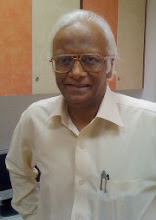A BALLOON CALLED SANGMA!
SUNNY
THOMAS
On Planet Earth, Purno
Sangma is unique. A creation of expediency, driven by irrelevance, floated by a
pair of chief ministers of uncontrollable ambition, and bloated by his own
towering ego, Sangma flies in the air like a hot-air balloon that catches
instant attention in an exhibition ground. The
Hindu headline ‘After the race is over, BJP backs Sangma’ does full justice
to the media armoury of humour. To get prime time on TV channels, the Brave Son
of India has challenged the man whose one leg is almost in the Rashtrapathi
Bhavan. The subject of debate could be `The Joy of Defection’ – a subject in
which no living politician can excel Sangma!
Many Indians believe Rahul
Gandhi will be Prime Minister in 2014, though none of them have any clue how.
Some have more faith in astrology than in science, while others have more faith
in their own faith than either science or astrology. Electoral calculus,
however, points to another direction. If Congress keeps losing elections at
this rate and BJP hell-bent on projecting Narendra Modi as prime ministerial
candidate even at the peril of dividing the party de facto, the newsmakers of
2014 will be Nitish Kumar and Mulayam Singh.
A chastened Congress and a
weakened BJP will not be able to meet the President without the numbers to form
a government. The post-2014 absurdities could even see Jaya and Naveen
blackmailing BJP into supporting one of them as PM to outsmart Nitish-Mulayam
game plans. Should the imponderable happen – Modi single-handedly emerging as
the winner – the Indian Republic will change forever. But demographic calculus
does upset Modi hopes.
The year 2014 could
witness the emergence of a new style of leadership, which will be more
accommodative, representative and sensitive to problems of the middle class.
The era of political arrogance will be a thing of the past.
Mamata’s tornado in Delhi
was the replication of her seething ambition that troubles her mind. She
clearly has prime ministerial ambitions and she thought her moment of truth has
arrived when the electoral verdict favoured her party. The demand for a
mid-term poll baked in Kolkata is calculated to elevate Mamata from Writer’s
Building to 7 Race Course! Her counterparts, Jaya and Naveen, too, have prime
ministerial ambitions and the ballooning of Sagma is a clumsy manoeuvre of
their overweening ambition.
``You can get along very
well with Abhishek Sengupta as long as you don’t criticize The Statesman,’’ said a student of Times school of Journalism,
pointing to the perfect Bengali gentleman. Newspapers are a habit difficult to
get out of, a matter of choice without rhyme or reason, a matter of taste
without a definition. A horror tabloid (tabloid not by the size of the paper
but by its content), Malayala Manorama
shocks its readers every morning with blown up stories of murders and mishaps!
A state where drinking is sacrosanct and even women get tipsy, a shock
treatment day after day does a great service to awaken them from their
dipsomania! Manorama devotes a whole
page for accident deaths, which makes one wonder whether there is something
horribly wrong with Kerala roads or something horribly wrong with Manorama Journalism (or both).
In fairness, it must be
said that Manorama reporting has a way
of touching your heart with their backgrounders. An accident story captures the
trauma of the relatives and brings forth a mini family saga. A success story,
especially of students, will have the profile of parents and teachers, men and
women you like to read about. Manorama
Journalism connects and that’s the secret of its phenomenal success.
The
Hindu and The Times of
India are poles apart: one is the antithesis of the other. The Hindu qualifies to be a newspaper
while The Times of India is anything
but a newspaper, which is the secret of its success (TOI is the world’s largest
circulated newspaper ahead of USA Today,
whether you like it or not). The Times of
India is a market-driven newspaper while The Hindu is a value-oriented
newspaper. A market-driven newspaper, in the traditional sense, is not a
newspaper but globalization has sparked the evolution of newspapers.
Value-oriented Journalism has disappeared from the face of the earth and the
last bastion of this school is the southern giant that defies evolution.
Will smart phones replace
newspapers, considering their amazing popularity and power of addiction? News
stories written in two or three lines with jingle-bells chiming at the
background, or even news stories composed as songs at the click of a mouse and
the young boys and girls glued to smart phones will indeed redefine Journalism.
Journalists beware!


No comments:
Post a Comment